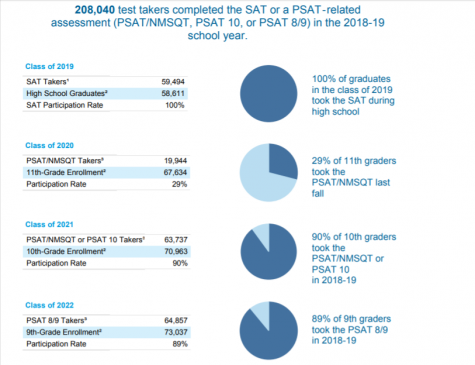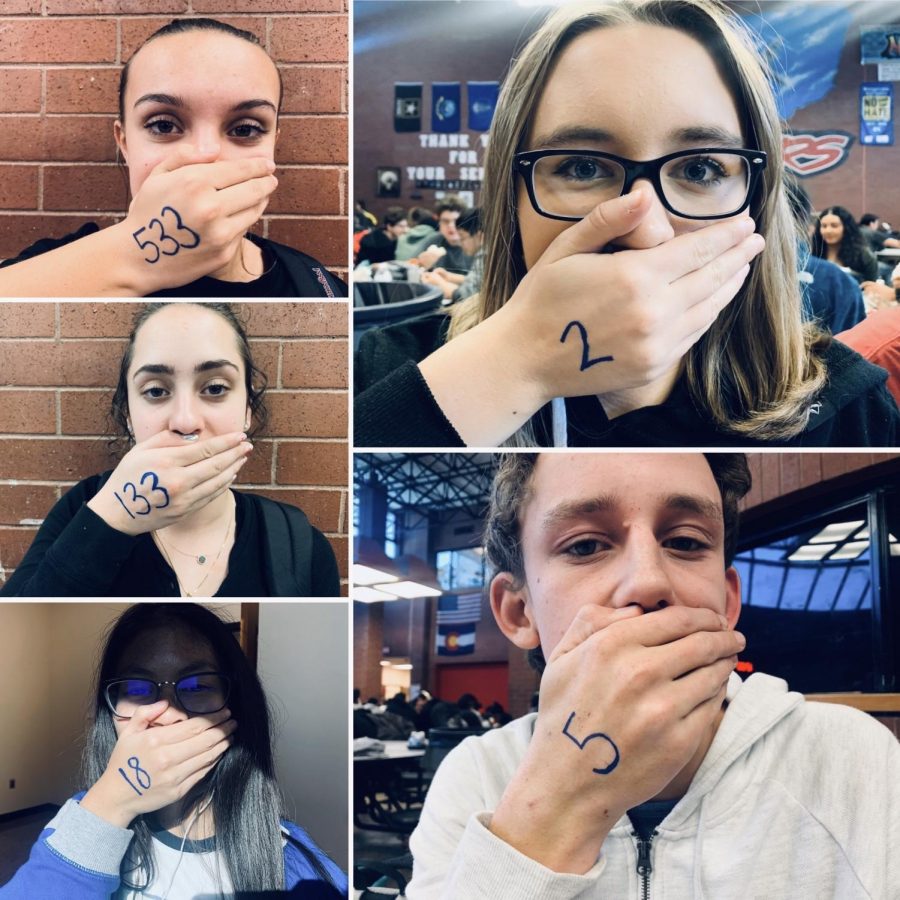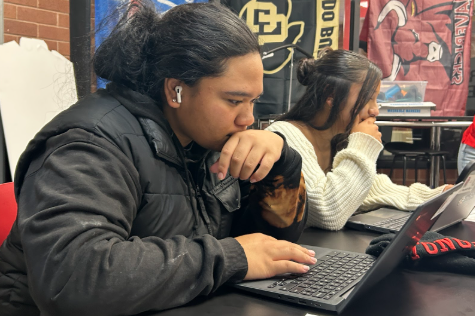Opinion: I am not just a number
Feature photo by: Joslyn Bowman – A collage of students pose with a number written on their hands. These numbers represent a label they’ve been given that they don’t like.
November 6, 2019
I am not just an SAT score. I am not just a GPA. I am not just a grade in math class. I am not just a class rank. I am not just my Instagram followers count. I am not just my snap score. I am not just a number.
Look around you, numbers are everywhere. Your age is a number, the amount of money you spend a week is a number, the followers you have on Instagram is a number—numbers are inevitable. Within society, numbers have begun to define who we are as humans; they have begun to dehumanize us.
Whether it be test scores, grades, or an Instagram following, numbers are defining us, especially in high school.
“I’m a number, but I don’t want to be a number,” said sophomore Ola Folarin.
In order to get into any colleges, SAT scores are looked at. From freshman year and up, Rangeview puts on multiple practice tests to improve a student’s test taking skills. In the 2018-19 school year, 204,040 students took the (P)SAT. In its description, it “measures a student’s college and career readiness”.
The desire to be a number—a high score on a test—has replaced the human aspect of many students. SAT scores create an easy way for colleges to compare applicants. Students are being compared as numbers—our character is being completely left in the dark. With the submission of all of these scores and grades, there is little room for a college to focus on who we are as a person—which is important.

Those who aim for high SAT scores also aim to have high grade point averages. In order to do so, a student must take honors classes, in which the subject areas at Rangeview High School are very limited.
Subject areas that weighted classes include: math, english, science, art, band, choir, and engineering.
While it’s easy to keep your SAT scores a secret from the world, the same doesn’t apply when it comes to class rankings. In the halls of Rangeview, there is talk about ‘who is number one’ and if that person deserves the spot or not.
Senior Avery Hill said, “[the class rank system] puts unnecessary pressure on kids and puts them against each other.”
If a student’s rank is low, it makes them feel unworthy because their number isn’t high enough compared to fellow classmates. It creates a stigma that the smartest in the school are the ones with the highest GPA, and it only pressures them to continue to get ‘As’, and that anything less is ‘failing’. By creating the idea that anything less than perfection is bad; it’s dehumanizing—depriving students of our human traits.
Sophomore Ciara Andrew said, “Class rank is an unfair representation of how good people are doing in school.”
As we become more focused on raising our GPAs, we begin to lose track of our interests and hobbies.
Folarin stated, “ I would love to take psychology, but I don’t think it’s weighted, and I need my GPA to be good.” This goes to show how students are beginning to select classes that they need to keep their rank higher rather than taking courses they are interested in.
Again, in an effort to become a better statistic, us students begin to forget about our character, and disappear into a web of what other people want us to be.
This influx of numbers isn’t just an academic problem; it’s an everyday problem. On our phones, numbers are everywhere. The amount of followers you have, the likes you get per post, the amount of notifications you get an hour: we are being turned into numbers.
One in every three people have some form of social media. People on these apps post their happiest parts of life, in hopes to ‘please’ others and to ‘get the most likes.’
Sophomore Kayla Bond said, “Numbers such as likes and follows are valued to an unhealthy amount, to the point where it can cause an individual to question their own worth and constantly compare themselves to others just because they don’t have as many likes.”

The more likes you have, the better your page is. The more followers you have, the more people you know. The higher your snap score, the more popular you are. Society has gotten to the point where the better your social media pages are, the more ‘valued’ you seem to be.
While this is true, apps such as Facebook and Instagram have taken steps towards eliminating these numbers from their sites. This year, Facebook and Instagram decided to hide the number of likes per post in Australia, in hopes of limiting the bad influence likes have on their users.
This change hasn’t done much for society yet, but it’s a step towards ridding our world of unfair societal standards, as Bond puts it, “numbers can have such a negative impact on an individual. It shows how much we as a society put someone who has more likes, followers, etc. on a pedestal.”
These numbers aren’t all that bad. Numbers such as SAT scores, grades, GPAs and class rankings help distinguish the students who are putting hard work in. High test scores are aiding students in getting accepted into college. Grades help reward students for their hard work and progression within school. GPAs and class rankings help showcase the students who take the most challenging classes while managing to pass all of them. Figures are used to calculate statistics for learning to help our society learn and grow.
Regardless, the negatives still outweigh the positives. Within our society, humans are being degraded for not being good enough. Instead of requiring test scores, more schools should follow colleges such as DU, where test scores are optional. Rather than rewarding students through class rank, all students should be given a pat on the back for improvement within school. Instead of showing the number of followers and likes someone gets, social media should be used for people to document what is happening in their lives for the friends and loved ones to see. We need to realize that we are human beings, not just categorizable numbers.
I am much more than just an SAT score. I am much more than just a GPA. I am much more than a grade in math class. I am much more than a class rank. I am much more than my Instagram followers count. I am much more than my snap score. I am much more than a number; I am a human being.














Halina G Jones • Nov 6, 2019 at 3:50 PM
Another outstanding perspective of Joslyn Bowman. Keep challenging these “social norms” I look forward to your next editorial. Well done!